Reflection Report: Cultural Identity and Healthcare Practices
VerifiedAdded on 2023/01/12
|7
|1354
|47
Report
AI Summary
This reflective report delves into the crucial role of cultural identity in healthcare, emphasizing its impact on patient care plans and outcomes. The report highlights the importance of cultural awareness and sensitivity among nurses, advocating for a trans-cultural approach to holistic care. It discusses how cultural values influence patient expectations, beliefs, and perceptions of health, and suggests practical considerations for nurses when developing care plans, including respecting patient beliefs, conducting holistic assessments, fostering healthy relationships, and maintaining open-mindedness. The report also addresses the healthcare disparities faced by diverse communities and underscores the significance of hiring nurses from diverse cultural backgrounds. Ultimately, the reflection concludes that understanding and respecting cultural diversity is essential for improving patient outcomes and promoting a holistic approach to healthcare, particularly for elderly patients and women. The report emphasizes the need for a patient-centered approach that prioritizes their well-being and cultural background.
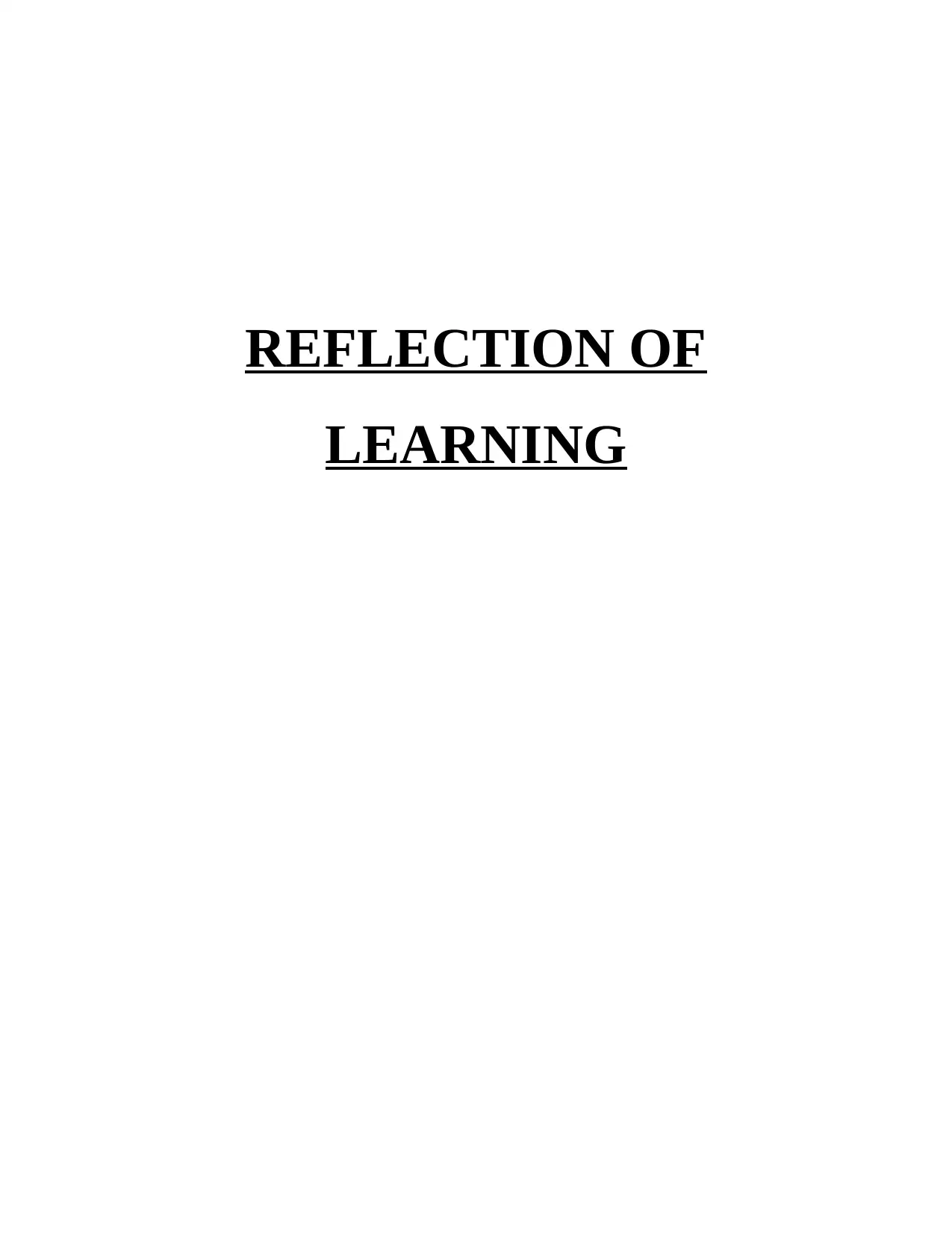
REFLECTION OF
LEARNING
LEARNING
Paraphrase This Document
Need a fresh take? Get an instant paraphrase of this document with our AI Paraphraser
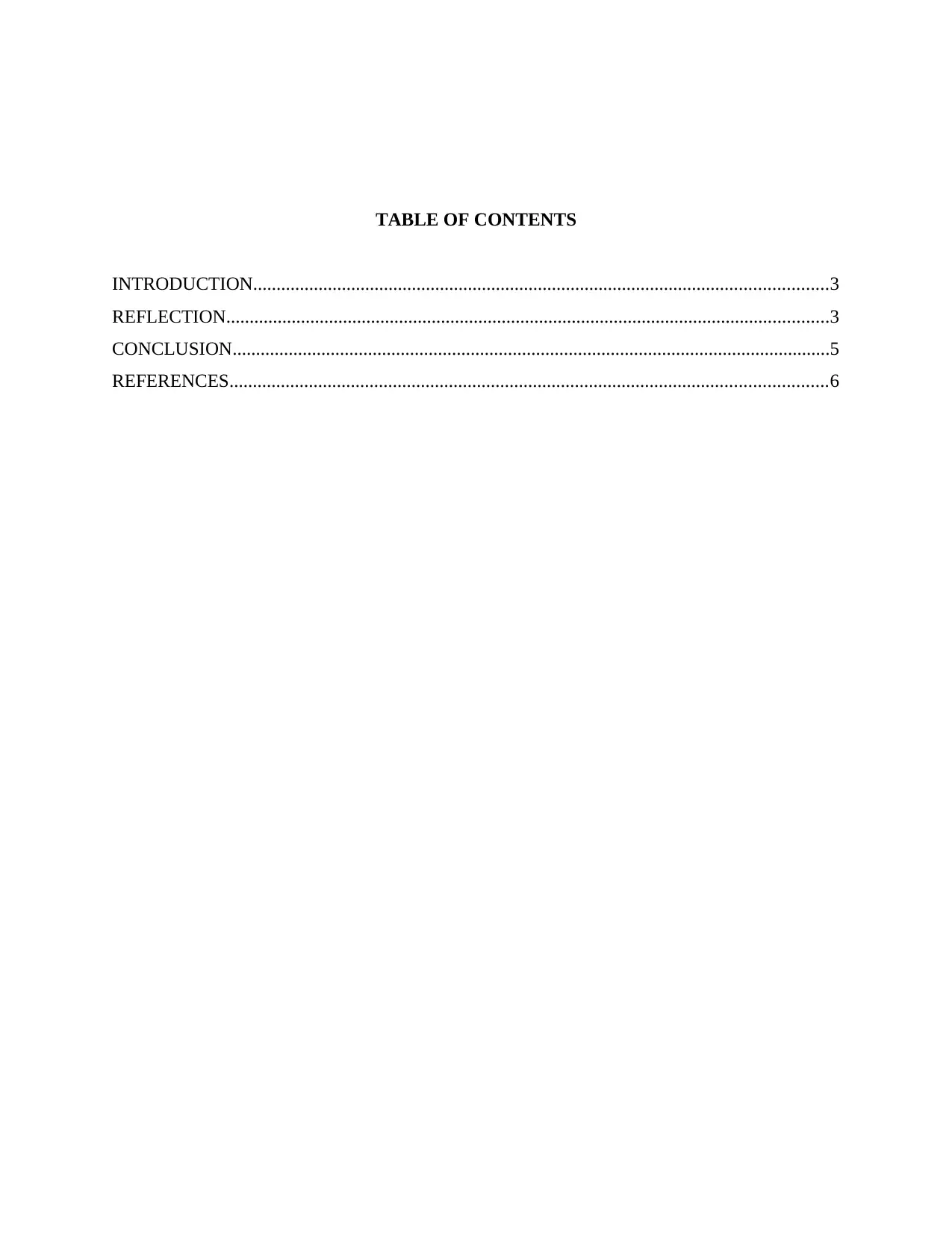
TABLE OF CONTENTS
INTRODUCTION...........................................................................................................................3
REFLECTION.................................................................................................................................3
CONCLUSION................................................................................................................................5
REFERENCES................................................................................................................................6
INTRODUCTION...........................................................................................................................3
REFLECTION.................................................................................................................................3
CONCLUSION................................................................................................................................5
REFERENCES................................................................................................................................6
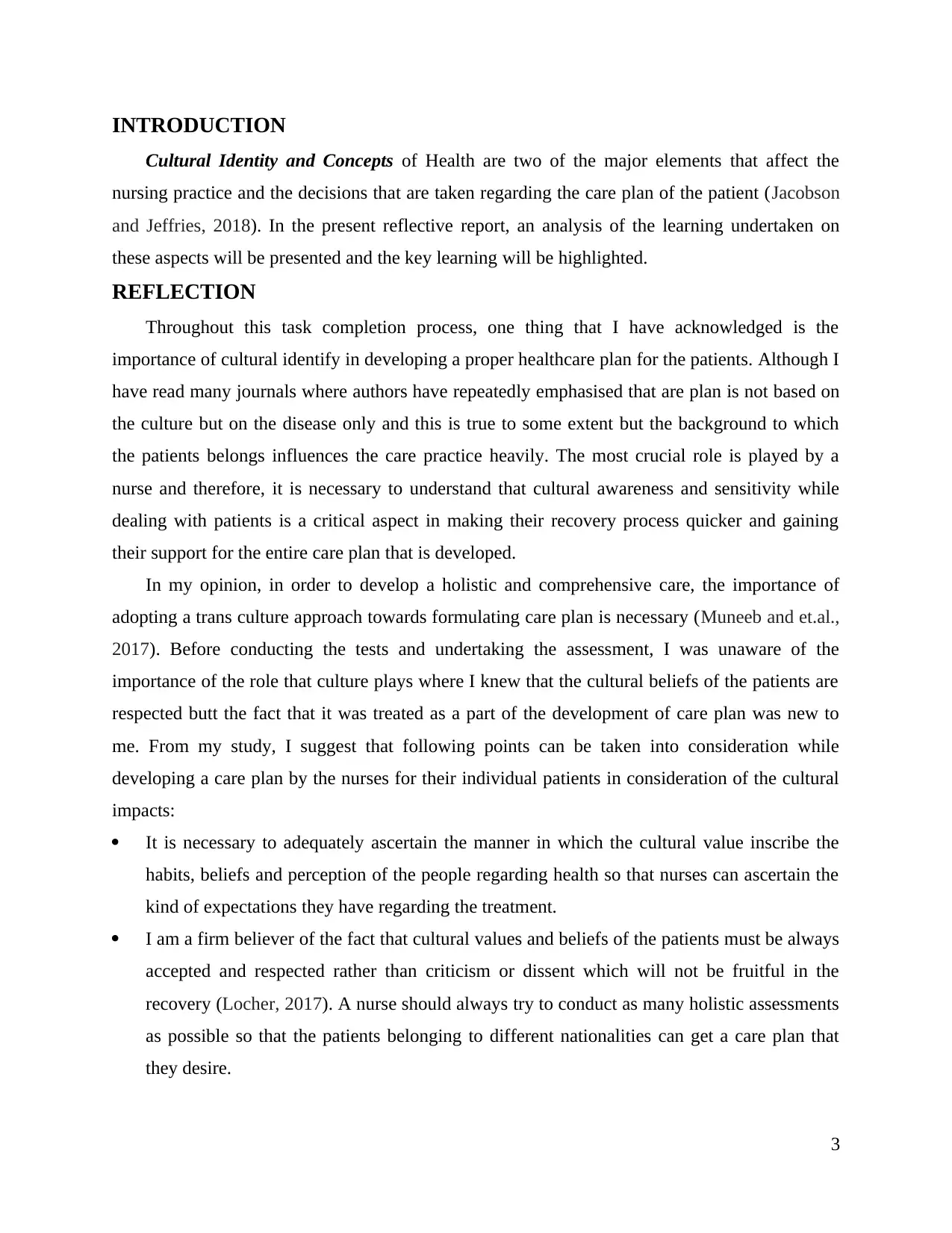
INTRODUCTION
Cultural Identity and Concepts of Health are two of the major elements that affect the
nursing practice and the decisions that are taken regarding the care plan of the patient (Jacobson
and Jeffries, 2018). In the present reflective report, an analysis of the learning undertaken on
these aspects will be presented and the key learning will be highlighted.
REFLECTION
Throughout this task completion process, one thing that I have acknowledged is the
importance of cultural identify in developing a proper healthcare plan for the patients. Although I
have read many journals where authors have repeatedly emphasised that are plan is not based on
the culture but on the disease only and this is true to some extent but the background to which
the patients belongs influences the care practice heavily. The most crucial role is played by a
nurse and therefore, it is necessary to understand that cultural awareness and sensitivity while
dealing with patients is a critical aspect in making their recovery process quicker and gaining
their support for the entire care plan that is developed.
In my opinion, in order to develop a holistic and comprehensive care, the importance of
adopting a trans culture approach towards formulating care plan is necessary (Muneeb and et.al.,
2017). Before conducting the tests and undertaking the assessment, I was unaware of the
importance of the role that culture plays where I knew that the cultural beliefs of the patients are
respected butt the fact that it was treated as a part of the development of care plan was new to
me. From my study, I suggest that following points can be taken into consideration while
developing a care plan by the nurses for their individual patients in consideration of the cultural
impacts:
It is necessary to adequately ascertain the manner in which the cultural value inscribe the
habits, beliefs and perception of the people regarding health so that nurses can ascertain the
kind of expectations they have regarding the treatment.
I am a firm believer of the fact that cultural values and beliefs of the patients must be always
accepted and respected rather than criticism or dissent which will not be fruitful in the
recovery (Locher, 2017). A nurse should always try to conduct as many holistic assessments
as possible so that the patients belonging to different nationalities can get a care plan that
they desire.
3
Cultural Identity and Concepts of Health are two of the major elements that affect the
nursing practice and the decisions that are taken regarding the care plan of the patient (Jacobson
and Jeffries, 2018). In the present reflective report, an analysis of the learning undertaken on
these aspects will be presented and the key learning will be highlighted.
REFLECTION
Throughout this task completion process, one thing that I have acknowledged is the
importance of cultural identify in developing a proper healthcare plan for the patients. Although I
have read many journals where authors have repeatedly emphasised that are plan is not based on
the culture but on the disease only and this is true to some extent but the background to which
the patients belongs influences the care practice heavily. The most crucial role is played by a
nurse and therefore, it is necessary to understand that cultural awareness and sensitivity while
dealing with patients is a critical aspect in making their recovery process quicker and gaining
their support for the entire care plan that is developed.
In my opinion, in order to develop a holistic and comprehensive care, the importance of
adopting a trans culture approach towards formulating care plan is necessary (Muneeb and et.al.,
2017). Before conducting the tests and undertaking the assessment, I was unaware of the
importance of the role that culture plays where I knew that the cultural beliefs of the patients are
respected butt the fact that it was treated as a part of the development of care plan was new to
me. From my study, I suggest that following points can be taken into consideration while
developing a care plan by the nurses for their individual patients in consideration of the cultural
impacts:
It is necessary to adequately ascertain the manner in which the cultural value inscribe the
habits, beliefs and perception of the people regarding health so that nurses can ascertain the
kind of expectations they have regarding the treatment.
I am a firm believer of the fact that cultural values and beliefs of the patients must be always
accepted and respected rather than criticism or dissent which will not be fruitful in the
recovery (Locher, 2017). A nurse should always try to conduct as many holistic assessments
as possible so that the patients belonging to different nationalities can get a care plan that
they desire.
3
⊘ This is a preview!⊘
Do you want full access?
Subscribe today to unlock all pages.

Trusted by 1+ million students worldwide
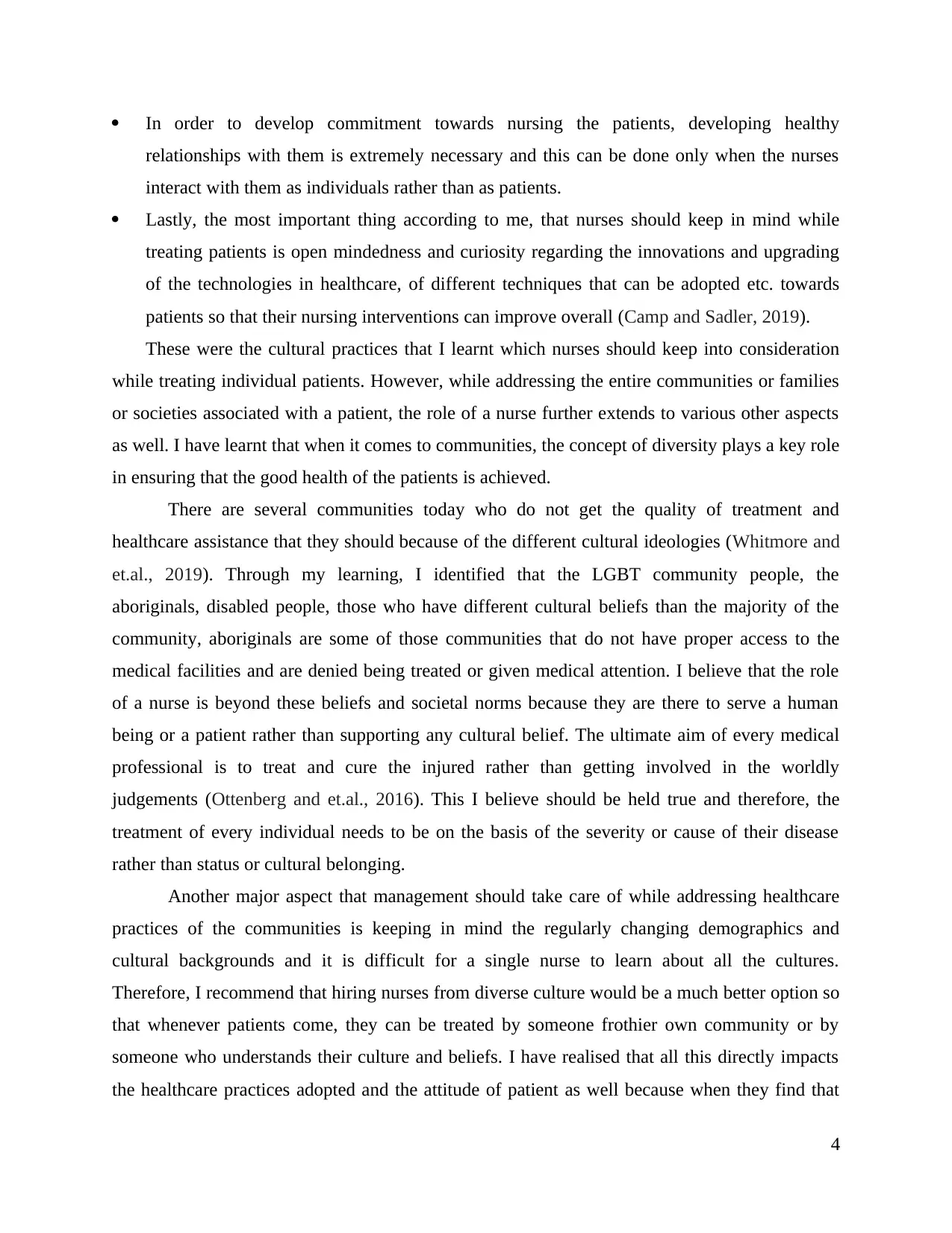
In order to develop commitment towards nursing the patients, developing healthy
relationships with them is extremely necessary and this can be done only when the nurses
interact with them as individuals rather than as patients.
Lastly, the most important thing according to me, that nurses should keep in mind while
treating patients is open mindedness and curiosity regarding the innovations and upgrading
of the technologies in healthcare, of different techniques that can be adopted etc. towards
patients so that their nursing interventions can improve overall (Camp and Sadler, 2019).
These were the cultural practices that I learnt which nurses should keep into consideration
while treating individual patients. However, while addressing the entire communities or families
or societies associated with a patient, the role of a nurse further extends to various other aspects
as well. I have learnt that when it comes to communities, the concept of diversity plays a key role
in ensuring that the good health of the patients is achieved.
There are several communities today who do not get the quality of treatment and
healthcare assistance that they should because of the different cultural ideologies (Whitmore and
et.al., 2019). Through my learning, I identified that the LGBT community people, the
aboriginals, disabled people, those who have different cultural beliefs than the majority of the
community, aboriginals are some of those communities that do not have proper access to the
medical facilities and are denied being treated or given medical attention. I believe that the role
of a nurse is beyond these beliefs and societal norms because they are there to serve a human
being or a patient rather than supporting any cultural belief. The ultimate aim of every medical
professional is to treat and cure the injured rather than getting involved in the worldly
judgements (Ottenberg and et.al., 2016). This I believe should be held true and therefore, the
treatment of every individual needs to be on the basis of the severity or cause of their disease
rather than status or cultural belonging.
Another major aspect that management should take care of while addressing healthcare
practices of the communities is keeping in mind the regularly changing demographics and
cultural backgrounds and it is difficult for a single nurse to learn about all the cultures.
Therefore, I recommend that hiring nurses from diverse culture would be a much better option so
that whenever patients come, they can be treated by someone frothier own community or by
someone who understands their culture and beliefs. I have realised that all this directly impacts
the healthcare practices adopted and the attitude of patient as well because when they find that
4
relationships with them is extremely necessary and this can be done only when the nurses
interact with them as individuals rather than as patients.
Lastly, the most important thing according to me, that nurses should keep in mind while
treating patients is open mindedness and curiosity regarding the innovations and upgrading
of the technologies in healthcare, of different techniques that can be adopted etc. towards
patients so that their nursing interventions can improve overall (Camp and Sadler, 2019).
These were the cultural practices that I learnt which nurses should keep into consideration
while treating individual patients. However, while addressing the entire communities or families
or societies associated with a patient, the role of a nurse further extends to various other aspects
as well. I have learnt that when it comes to communities, the concept of diversity plays a key role
in ensuring that the good health of the patients is achieved.
There are several communities today who do not get the quality of treatment and
healthcare assistance that they should because of the different cultural ideologies (Whitmore and
et.al., 2019). Through my learning, I identified that the LGBT community people, the
aboriginals, disabled people, those who have different cultural beliefs than the majority of the
community, aboriginals are some of those communities that do not have proper access to the
medical facilities and are denied being treated or given medical attention. I believe that the role
of a nurse is beyond these beliefs and societal norms because they are there to serve a human
being or a patient rather than supporting any cultural belief. The ultimate aim of every medical
professional is to treat and cure the injured rather than getting involved in the worldly
judgements (Ottenberg and et.al., 2016). This I believe should be held true and therefore, the
treatment of every individual needs to be on the basis of the severity or cause of their disease
rather than status or cultural belonging.
Another major aspect that management should take care of while addressing healthcare
practices of the communities is keeping in mind the regularly changing demographics and
cultural backgrounds and it is difficult for a single nurse to learn about all the cultures.
Therefore, I recommend that hiring nurses from diverse culture would be a much better option so
that whenever patients come, they can be treated by someone frothier own community or by
someone who understands their culture and beliefs. I have realised that all this directly impacts
the healthcare practices adopted and the attitude of patient as well because when they find that
4
Paraphrase This Document
Need a fresh take? Get an instant paraphrase of this document with our AI Paraphraser
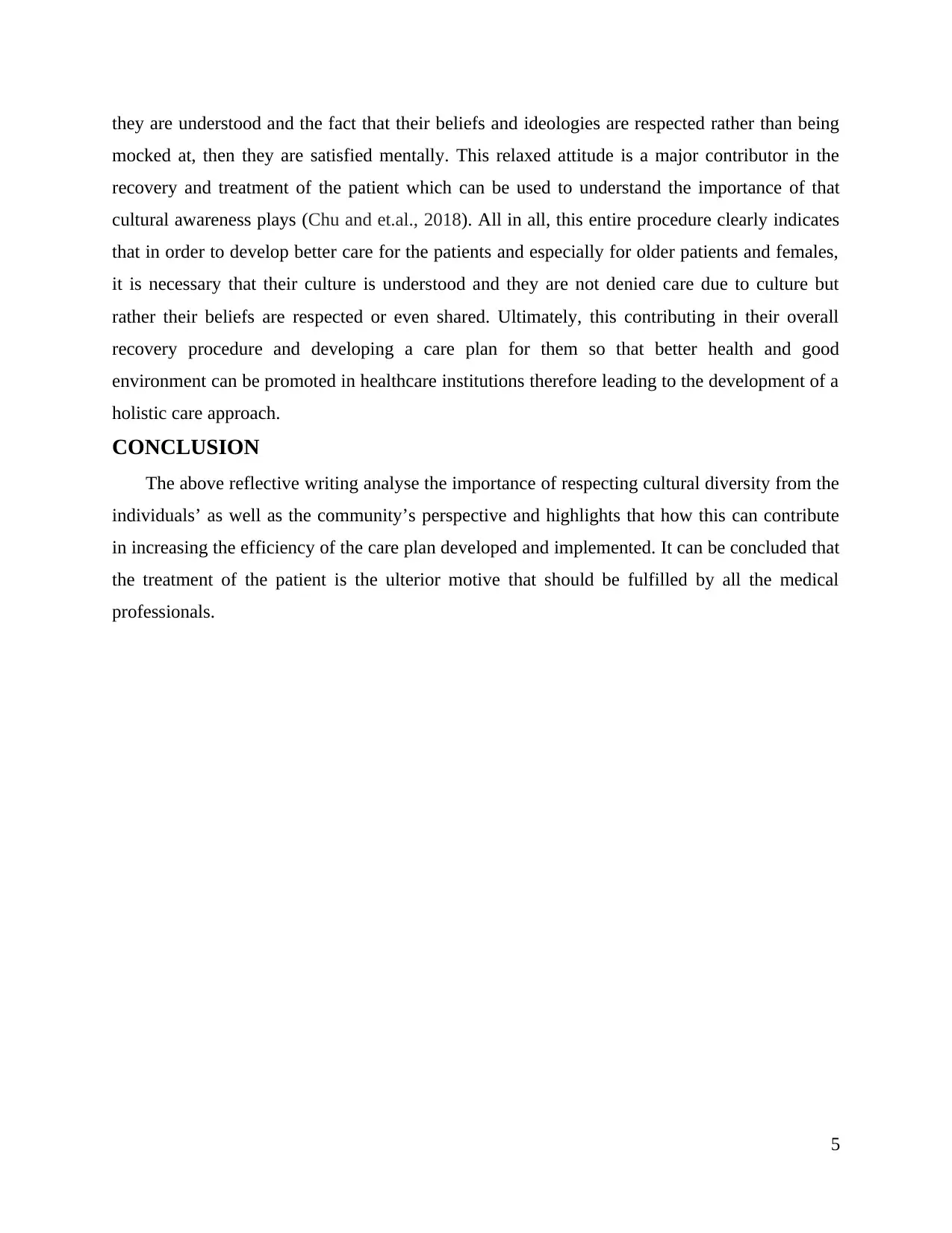
they are understood and the fact that their beliefs and ideologies are respected rather than being
mocked at, then they are satisfied mentally. This relaxed attitude is a major contributor in the
recovery and treatment of the patient which can be used to understand the importance of that
cultural awareness plays (Chu and et.al., 2018). All in all, this entire procedure clearly indicates
that in order to develop better care for the patients and especially for older patients and females,
it is necessary that their culture is understood and they are not denied care due to culture but
rather their beliefs are respected or even shared. Ultimately, this contributing in their overall
recovery procedure and developing a care plan for them so that better health and good
environment can be promoted in healthcare institutions therefore leading to the development of a
holistic care approach.
CONCLUSION
The above reflective writing analyse the importance of respecting cultural diversity from the
individuals’ as well as the community’s perspective and highlights that how this can contribute
in increasing the efficiency of the care plan developed and implemented. It can be concluded that
the treatment of the patient is the ulterior motive that should be fulfilled by all the medical
professionals.
5
mocked at, then they are satisfied mentally. This relaxed attitude is a major contributor in the
recovery and treatment of the patient which can be used to understand the importance of that
cultural awareness plays (Chu and et.al., 2018). All in all, this entire procedure clearly indicates
that in order to develop better care for the patients and especially for older patients and females,
it is necessary that their culture is understood and they are not denied care due to culture but
rather their beliefs are respected or even shared. Ultimately, this contributing in their overall
recovery procedure and developing a care plan for them so that better health and good
environment can be promoted in healthcare institutions therefore leading to the development of a
holistic care approach.
CONCLUSION
The above reflective writing analyse the importance of respecting cultural diversity from the
individuals’ as well as the community’s perspective and highlights that how this can contribute
in increasing the efficiency of the care plan developed and implemented. It can be concluded that
the treatment of the patient is the ulterior motive that should be fulfilled by all the medical
professionals.
5
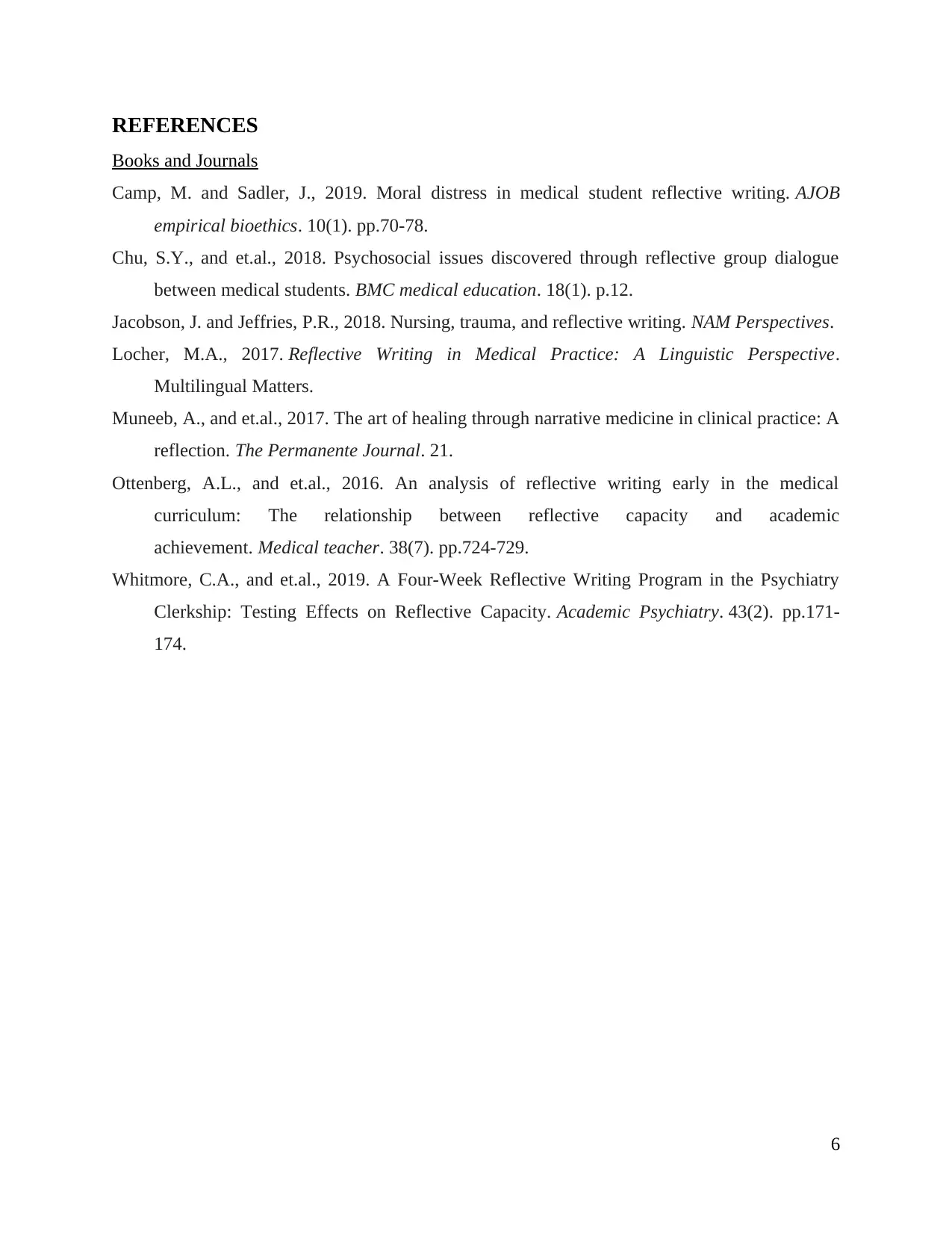
REFERENCES
Books and Journals
Camp, M. and Sadler, J., 2019. Moral distress in medical student reflective writing. AJOB
empirical bioethics. 10(1). pp.70-78.
Chu, S.Y., and et.al., 2018. Psychosocial issues discovered through reflective group dialogue
between medical students. BMC medical education. 18(1). p.12.
Jacobson, J. and Jeffries, P.R., 2018. Nursing, trauma, and reflective writing. NAM Perspectives.
Locher, M.A., 2017. Reflective Writing in Medical Practice: A Linguistic Perspective.
Multilingual Matters.
Muneeb, A., and et.al., 2017. The art of healing through narrative medicine in clinical practice: A
reflection. The Permanente Journal. 21.
Ottenberg, A.L., and et.al., 2016. An analysis of reflective writing early in the medical
curriculum: The relationship between reflective capacity and academic
achievement. Medical teacher. 38(7). pp.724-729.
Whitmore, C.A., and et.al., 2019. A Four-Week Reflective Writing Program in the Psychiatry
Clerkship: Testing Effects on Reflective Capacity. Academic Psychiatry. 43(2). pp.171-
174.
6
Books and Journals
Camp, M. and Sadler, J., 2019. Moral distress in medical student reflective writing. AJOB
empirical bioethics. 10(1). pp.70-78.
Chu, S.Y., and et.al., 2018. Psychosocial issues discovered through reflective group dialogue
between medical students. BMC medical education. 18(1). p.12.
Jacobson, J. and Jeffries, P.R., 2018. Nursing, trauma, and reflective writing. NAM Perspectives.
Locher, M.A., 2017. Reflective Writing in Medical Practice: A Linguistic Perspective.
Multilingual Matters.
Muneeb, A., and et.al., 2017. The art of healing through narrative medicine in clinical practice: A
reflection. The Permanente Journal. 21.
Ottenberg, A.L., and et.al., 2016. An analysis of reflective writing early in the medical
curriculum: The relationship between reflective capacity and academic
achievement. Medical teacher. 38(7). pp.724-729.
Whitmore, C.A., and et.al., 2019. A Four-Week Reflective Writing Program in the Psychiatry
Clerkship: Testing Effects on Reflective Capacity. Academic Psychiatry. 43(2). pp.171-
174.
6
⊘ This is a preview!⊘
Do you want full access?
Subscribe today to unlock all pages.

Trusted by 1+ million students worldwide

7
1 out of 7
Related Documents
Your All-in-One AI-Powered Toolkit for Academic Success.
+13062052269
info@desklib.com
Available 24*7 on WhatsApp / Email
![[object Object]](/_next/static/media/star-bottom.7253800d.svg)
Unlock your academic potential
Copyright © 2020–2026 A2Z Services. All Rights Reserved. Developed and managed by ZUCOL.





